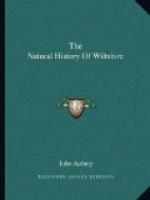Summos
posse viros, et magna exempla daturos
Vervecû
in patria, crassoque sub aere nasci.
Neither is yr observation universally true that the sons of labourers and rusticks are more dull and indocile than those of gentlemen and tradesmen; for though I doe not pretend to have become of the first magnitude for wit or docility, yet I think I may without arrogance say that in our paltry country school here at Braintry — “Ego meis me minoribus condiscipulis ingenio prælu[si]”: but perchance the advantage I had of my contemporaries may rather be owing to my industry than natural parts; so that I should rather say “studio” or “industria excellui”.
I think (if you can give me leave to be free with you) that you are a little too inclinable to credit strange relations. I have found men that are not skilfull in ye history of nature, very credulous, and apt to impose upon themselves and others, and therefore dare not give a firm assent to anything they report upon their own autority; but are ever suspicious that they may either be deceived themselves, or delight to teratologize (pardon ye word) and to make a shew of knowing strange things.
You write that the Museum at Oxford was rob’d, but doe not say whether your noble present was any part of the losse. Your picture done in miniature by Mr. Cowper is a thing of great value, I remember so long agoe as I was in Italy, and while he was yet living, any piece of his was highly esteemed there; and for that kind of painting he was esteemed the best artist in Europe.
What my present opinion is concerning formed stones, and concerning the formation of the world, you will see in a discourse that is now gone to the presse concerning the Dissolution of the World: my present opinion, I say, for in such things I am not fix’t, but ready to alter upon better information, saving always ye truth of ye letter of ye scripture. I thank you for your prayers and good wishes, and rest,
Sr, your very humble servant,
JohnRay.
I have seen many pheasants in a little grove by the city of Florence, but I suppose they might have been brought in thither from some foreign country by the Great Duke.
Surely you mistook what I wrote about elms. I never to my knowledge affirmed that the most common elm grows naturally in the north: but only thought that though it did not grow there, yet it might be native of England: for that all trees doe not grow in all countreys or parts of England. The wych-hazel, notwithstanding its name, is nothing akin to the “corylus” but a true elm.
The story concerning the drawing out the nail driven crosse the wood-pecker’s hole is without doubt a fable.
Asseveres and vesicates are unusuall words, and I
know not whether the wits will allow them.
___________________________________




